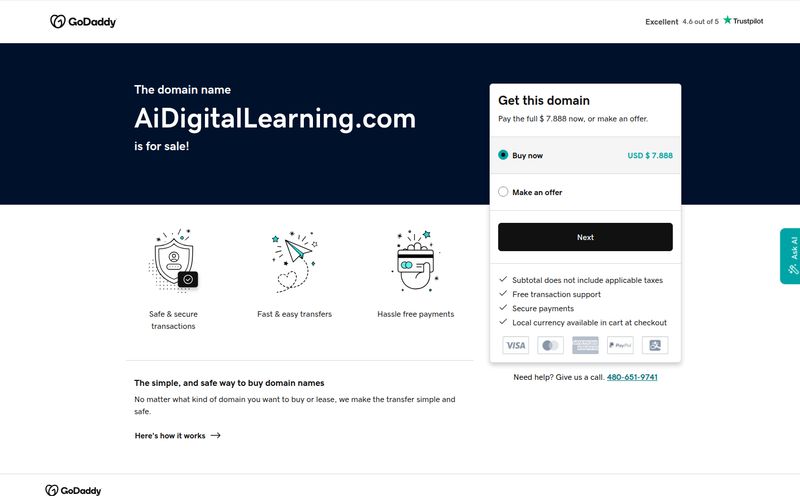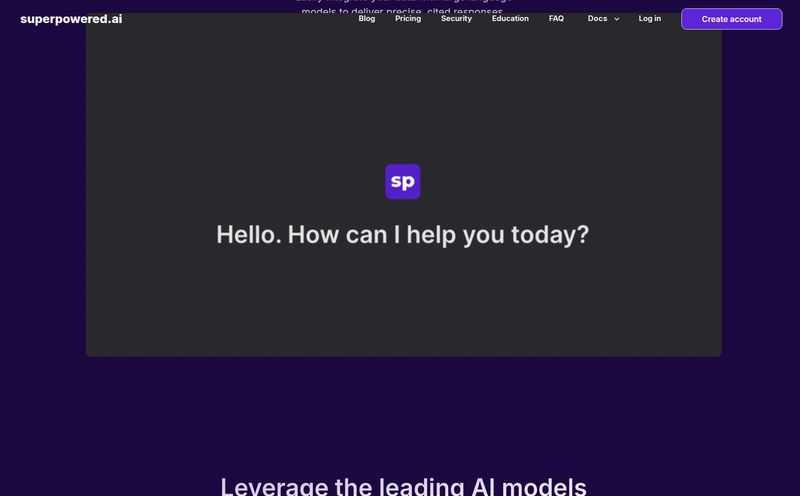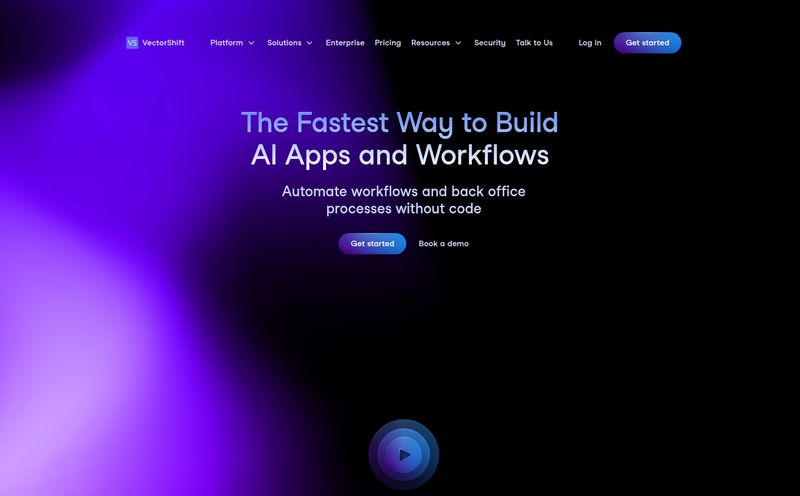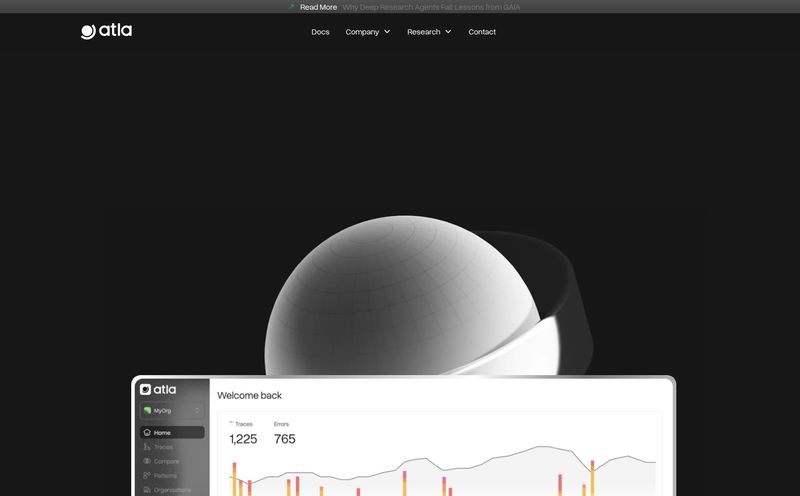I swear, every morning I wake up, scroll through Twitter (or X, whatever we're calling it this week), and there's a new AI model that promises to change the world. It’s exciting, for sure, but also… a little exhausting. The gap between reading a whitepaper and actually doing something with the tech can feel like a chasm. You can watch all the YouTube tutorials you want, but at some point, you have to jump in and get your hands dirty. That's where I've seen so many people get stuck.
And that’s exactly why I need to tell you about Lablab.ai. I stumbled upon it a while back, and it's not just another learning platform or a repository of code snippets. It’s a community. A buzzing, chaotic, brilliant hub for people who want to stop talking about AI and start building with it. The homepage flashes some pretty impressive numbers—over 219,000 community members and 3,000 prototypes built. That’s not just fluff; that's proof of an active, engaged user base.
What Exactly is Lablab.ai Anyway?
Think of it as a gym, but for your AI development muscles. Lablab.ai is built around one core idea: hackathons. If you’ve never been in one, imagine a sprint. A mad, creative dash where you and a team try to build something amazing, from scratch, in a very short amount of time—usually a weekend. It's intense. It's collaborative. And it's one of the fastest ways to learn I’ve ever experienced.
Their whole mission is about "Empowering AI Innovation," and they do that by partnering with the biggest names in the game—think OpenAI, Cohere, Stability AI—and giving you access to their state-of-the-art tools. For free. Yeah, you read that right.
The Heart of the Matter: The AI Hackathons
This is the main event. It’s what Lablab.ai is famous for. The energy in these things is electric. A whirlwind of ideas, Discord channels buzzing with activity, and that shared, slightly panicked feeling of a deadline looming. But it's a structured chaos, and they guide you through it beautifully.
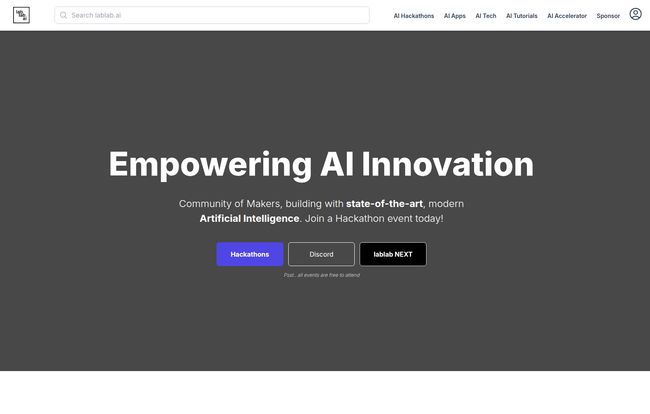
Visit Lablab.ai
A Challenge is Thrown Down
Every hackathon starts with a theme or a specific technology. It could be building something with the latest GPT model, creating a new app with a generative video tool, or solving a real-world problem. This focus prevents the 'blank page' paralysis and gives everyone a starting point.
Finding Your Tribe (or Bringing Your Own)
One of the biggest hurdles for people is the team aspect. "I don't know anyone!" I hear you. Lablab.ai has a system for that. You can register solo and get matched with other builders based on skills and interests. Or, if you have your crew, you can sign up together. It’s a great way to combat the imposter syndrome that plagues our industry; you quickly realize everyone is there to learn and contribute.
More Than Just Coding: Workshops and Mentoring
This is a huge differentiator. They don’t just throw you in the deep end. Before and during the hackathon, they run workshops led by industry experts. These aren't boring lectures. They're hands-on sessions showing you how to actually use the featured AI tech. Plus, you get access to mentors who can help you when you inevitably get stuck on some obscure bug at 2 AM. This support structure is invaluable.
Is It Really Free? The Question of Cost
Okay, let's address the elephant in the room. In a world where every SaaS tool has three tiers and a credit card form, how can this be free? I was skeptical too. But it is. All the events are free to attend. Their business model seems to be built around community, sponsorships with the big AI labs who want people using their new APIs, and fostering genuine innovation. They're playing the long game. By building a massive community of talented AI builders, they create a self-sustaining ecosystem. It’s a classic community-building play, and frankly, it’s refreshing.
Beyond the Hackathon: What Else is on Offer?
While the hackathons are the main draw, the platform has more to it. It’s not just a weekend fling; it's a place you can stick around.
- The AI Apps Platform: This is a gallery of past projects. It's an incredible source of inspiration. Before you even join a hackathon, you can browse what other teams have built, see what's possible, and get your creative juices flowing.
- AI Tech Resources & Tutorials: The learning doesn’t stop when the hackathon ends. They have a growing library of articles and tutorials that you can access anytime.
- The lablab NEXT Accelerator: This might be the most exciting part. The best projects don't just get a virtual trophy and then disappear. Lablab.ai has an accelerator program to help promising teams turn their hackathon prototype into a real startup. This provides a tangible path from idea to impact.
My Honest Take: The Good, The Bad, and The Realistic
No platform is perfect, and it’s important to go in with your eyes open. I've always felt that honest reviews are the most helpful, so here's my breakdown.
| What I Love (The Pros) | What You Should Know (The Cons) |
|---|---|
| Unbelievable access to cutting-edge AI tools that would normally be expensive or hard to get. The fact that it's free is just the cherry on top. | Hackathons are, by nature, time-limited and intense. It's a sprint, not a marathon. Not everyone thrives under that pressure. |
| The community is the real gold here. You're surrounded by motivated, intelligent people from all over the world. It’s a fantastic networking opportunity. | Your success and experience heavily depend on your team's collaboration and skills. A bad team dynamic can sour the experience. |
| It's a practical, hands-on learning environment. You'll learn more in 48 hours of building than in weeks of passive reading. | Popular events and programs can have limited spots. You have to be on the ball and register early. |
Who is Lablab.ai For? (And Who It Might Not Be For)
This platform is a godsend for a few specific groups. Students who want to build a portfolio. Developers looking to pivot into the AI space. Entrepreneurs searching for a co-founder or a validated idea. Even curious non-coders, like marketers or designers, can join to learn about product creation and contribute in their own way. If you have a bias for action, you'll fit right in.
However, if you're looking for a slow, methodical, university-style course with months to perfect every detail, this probably isn't it. And if you hate deadlines and high-pressure teamwork, you might find the pace a bit jarring. It’s a specific flavor of learning, and it’s not for everyone.
"The best way to predict the future is to build it. Lablab.ai gives you the tools, the ingredients, and the community. The rest is up to you."
At the end of the day, Lablab.ai has managed to bottle lightning. It’s captured the frenetic, exciting energy of the current AI boom and channeled it into a productive, community-driven platform. It's one of the few places that bridges the gap between theory and practice in a way that’s accessible to almost anyone with an internet connection and a desire to create.
Frequently Asked Questions About Lablab.ai
- Do I need to be an expert coder to join a hackathon?
- Not at all. Teams need a mix of skills! Designers, project managers, marketers, and idea-people are just as valuable as coders. It's about collaboration, and there are roles for various skill levels.
- Can I participate in a hackathon by myself?
- Yes, you can work solo, but they highly encourage teaming up. The platform has tools to help you find teammates before the event kicks off, so you can join even if you don't have a pre-made team.
- What happens to the projects we build? Do I keep the IP?
- You own what you build. Lablab.ai's goal is to foster innovation, not to own your ideas. You and your team retain the intellectual property of your project.
- Are the hackathons all online?
- The vast majority are virtual, allowing for global participation. This makes them incredibly accessible, no matter where you are in the world.
- How does Lablab.ai make money if the events are free for users?
- They primarily partner with leading AI companies and tech providers. These companies sponsor the hackathons to get their latest technologies into the hands of innovative builders and receive valuable feedback. It's a win-win situation.
- What kind of AI technologies do they feature?
- They work with a wide range of state-of-the-art AI. This includes large language models (like those from OpenAI), text-to-image generators (like Stable Diffusion), voice and audio AI, and other specialized tools from partners like Cohere and Deepgram.
References and Sources
- Lablab.ai Official Website
- The Lablab.ai Blog
- OpenAI - A frequent partner in Lablab.ai events.
- Devpost - A general hackathon platform for comparison.
